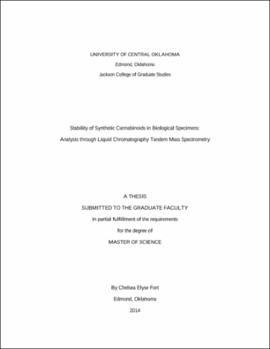| dc.description.abstract | Synthetic cannabinoids, known as spice or K2 among others, create an ever-changing challenge for the forensic chemist or toxicologist. The spectrum of compounds is constantly growing and evolving. Understanding the stability and degradation timelines for these under-characterized substances will be valuable for forensic chemists across the globe as they endeavor to manage their case loads. The focus of this study was to determine the stability of four specific synthetic cannabinoids, XLR-11, UR-144, AB-Pinaca, and AB-Fubinaca. The study used human blood spiked with the compounds of interest to mimic real forensic laboratory samples submitted for synthetic cannabinoid analysis. These whole blood samples were stored under three different temperature conditions, room or ambient temperature (22??C), refrigerator temperature (4??C), and freezer conditions (-20??C). Scheduled testing on days 0, 3, 7, 14, 21, 28, 35, 42, 56, 70, and 84 were spanned the study's nearly three month duration, monitoring stability and degradation of the analytes spiked into whole blood samples. Whole blood samples were then extracted using a forward alkaline extraction at pH 10.2 and analyzed using a liquid chromatograph tandem mass spectrometer (LC-MS/MS). Results showed that AB-Fubinaca, AB-Pinaca, and UR-144 were relatively stable, while XLR-11 significantly degraded at ambient and refrigerated conditions. Frozen storage conditions were the only tested parameter able to preserve and stabilize all four compounds over the three month period. Therefore, it should be suggested that forensic blood evidence suspected of containing synthetic cannabinoid compounds should be stored in frozen conditions. | |
